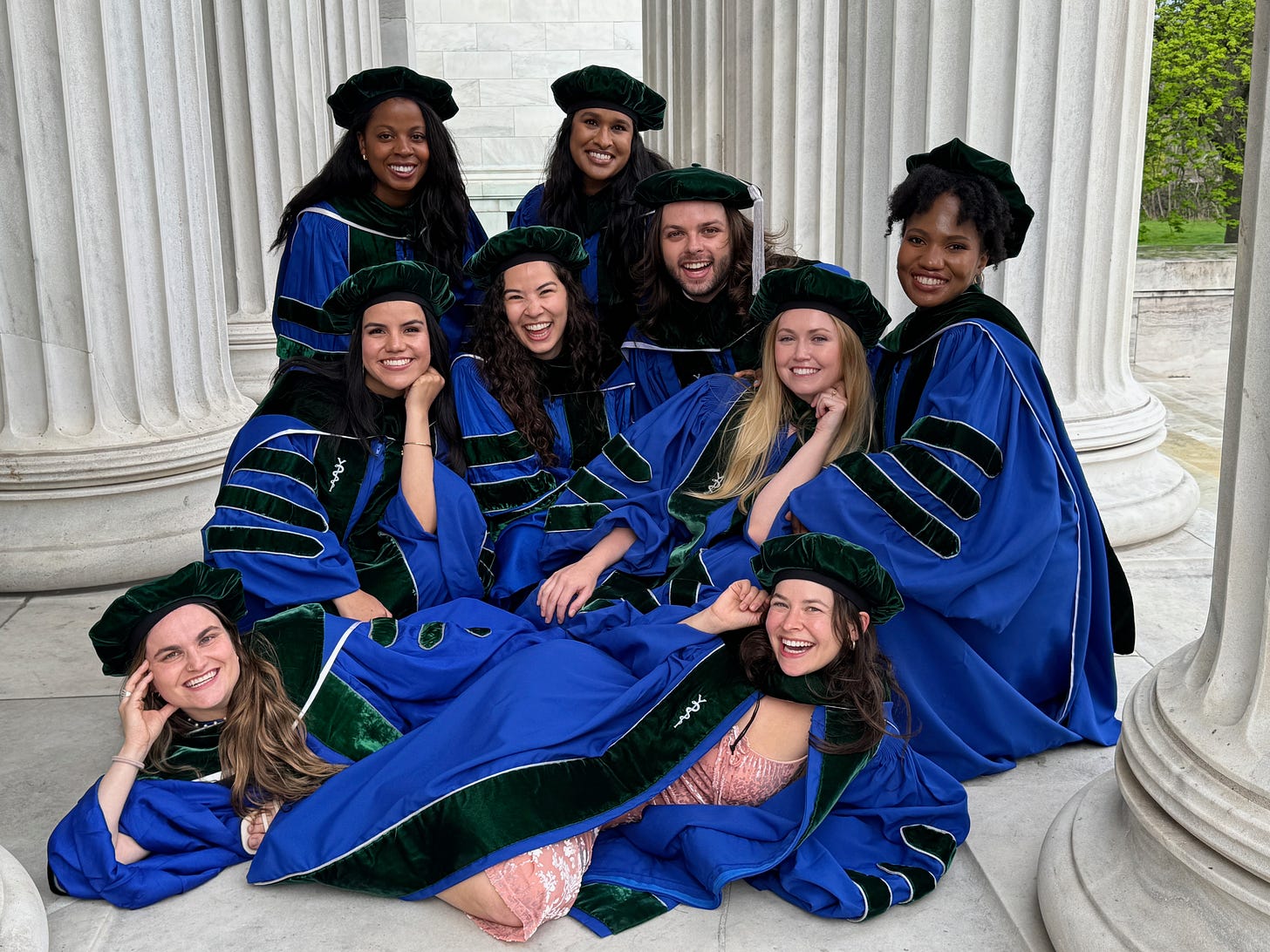The Crisis in Primary Care
If the so-called "Big Beautiful Bill"--or what I like to call the Unhinged Ugly Usurping--passes the Senate, say goodbye to finding a primary care physician in your neighborhood. Or anywhere.
I will admit, with no lack of shame, that I’d never heard of the Public Service Loan Forgiveness program before my daughter, who just graduated med school with over $280,000 in debt, told me several weeks ago that it is in a full-scale, three-alarm-fire crisis under our current regime as they attempt to ram through their new domestic policy bill. It is a crisis that will directly affect her, her public university med school classmates, and their ability to keep working as physicians without going bankrupt. Moreover, it will also affect the entire future of primary care medicine in America: should this bill pass, only the uber rich will be able to afford to go into medicine, thereby creating an even bigger hole in our country’s already unraveling primary care safety net.
The only reason my daughter and many of her classmates agreed to take on this amount of debt to become family medicine practitioners in underserved communities—primary care is one of the least-well remunerated practices in America to begin with, and dedicating your life to the underserved only furthers this distinction—was because they knew that the federal PSLF program would provide a ten-year, reasonable path to financial solvency through the forgiveness of the rest of their loans after those ten years if they: a) worked in a qualifying public service job in an underserved community, which my daughter planned to do anyway; and b) made 120 qualifying monthly payments over the course of ten years, which would be directly tied to their reduced salaries. After which they would finally be free of the financial noose of their med school loans.
Why we force our doctors in America to take on this amount of debt to begin with is an essay for another day, and, in recent years, some med schools such as NYU, Albert Einstein (thanks to a $1 billion gift from Ruth L. Gottesman), and Johns Hopkins (thanks to a $1 billion gift from Bloomberg Philanthropies) have started to confront this increasingly untenable situation, both for students and for their future patients, by offering free tuition. But free tuition is still not the med school norm, it came too late for my daughter and her classmates, and if the Project 2025-sponsored domestic bill passes the senate, capping PSLF at $150,000—when medical school at even a public university, like the one my daughter attended, already costs twice that much today, never mind in the future—then, within a few short years, any American living in a rural or underserved area will no longer be able to find a primary care doctor within driving distance of their home.
As if they hadn’t already been having trouble finding one.
In fact, according to the federal Health Resources and Services Administration, by 2037, the U.S. will face a shortage of 187,130 physicians, including 87,150 primary care physicians. Primary care, as I’m sure you’re all aware, plays a critical role in both the early detection of chronic diseases and in their ongoing management. My former primary care physician, for example, saved my four-year-old son’s life when he told me to run, do not walk, to the nearest emergency room after he correctly suspected my child had Kawasaki disease, a rare if sometimes deadly autoimmune disease that is the leading causes of heart attacks in children under the age of five. He also saved my life. Three times! But like so many primary care physicians in private practice, who’ve either folded their practices or seen them gobbled up by private equity investment, he’s had to offer concierge services and expand the number of offices he runs just to keep practicing medicine, get paid back by insurance, and break even. Nevertheless, I can no longer even see him anyway, as he doesn’t take Fidelis, my otherwise pretty good Obamacare insurance.
I say all this as prelude to explaining why, when editor Francesca Donner asked me to write a story for the feminist publication The Persistent on DIY’ing my daughter’s recent wedding, and I said sure but tried to keep it super light and bridal fluffy, I realized I couldn’t even write about my own child’s wedding without mentioning how this ongoing threat against the PSLF program—a program, I will repeat, I didn’t even know existed until a few months ago—had crept into nearly every corner of even the most sacred of ceremonies.
Which to me says so much about how we are all living now. How I long for the days when the government simply did its job so I could do mine. Instead, many of us worry daily, if not hourly, about how each insult to science, society, human intelligence, universities, immigrants, the rule of law, and our constitution will ultimately affect each of us, both personally and as a society, as well as our hopes for a better, more equitable future for our children.
Do we really want to live in a country in which only the children of the uber rich can become doctors? My daughter’s graduating med school class was filled with young people from every walk of life, every corner of the globe, and every type of background, each of them hoping to do their part to keep their communities alive and well in a country that now wants to put even more obstacles in place to keep them from this often thankless pursuit.

So, please: call your senators! It makes a difference! Tell them that they should not vote for a bill that will essentially end primary care in America while simultaneously lining the pockets of the wealthy with even more billions than any of them could ever spend in a single lifetime. Here’s some boilerplate language I’ve cut and pasted from 5 Calls to use, or feel free to adapt it to your own voice:
Hi, my name is [NAME] and I’m a constituent from [CITY, ZIP].
I’m calling to urge [REP/SEN NAME] oppose H.R. 1, the House budget reconciliation bill, and its harmful cuts to vital government programs.
[OPTIONAL]: Specifically, I’m very concerned about… [PICK 1-3 budget provisions]
the massive increase in the federal deficit, (and)
the cuts to student aid, (and)
the cuts to federal worker retirement benefits, (and)
the defunding of the Consumer Financial Protection Bureau, (and)
the roll back of the Inflation Reduction Act's urgent climate-focused programs, (and)
the elimination of gun silencer taxes, (and)
the remittance tax on immigrants, (and)
the partisan attack on federal regulations.
Congress should pass a fair and responsible budget that helps working families and communities, not one that slashes our benefits to fund tax cuts for the wealthy.
Thank you for your time and consideration.
IF LEAVING VOICEMAIL: Please leave your full street address to ensure your call is tallied.







I see the insurance company/health care crisis from both sides. I find it difficult to give the care that I want AND difficult to GET the care that I want. Running a private practice I have just decided to do what I want, argue as much as I have to with insurance (on the daily), but, paid or not, always try to give the best care to my patients. Thanks for writing.
Other countries already think we are crazy because we don’t have universal healthcare. What must they think when they see the debt doctors have to taken on even when they agree to work in underserved communities. Btw, I am curious how those communities voted, including those that were too busy to vote. So is extra 3 hours of driving each time you need healthcare worth the time savings of not bothering to vote in 2024?